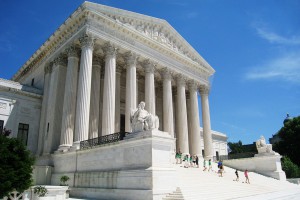Supreme Court of the United States (SCOTUS): The Court with a ratio of 5:4 has cleared the way for the resumption of execution of federal prisoners. The Judges voted to allow the first executions on the federal level since 2003 to proceed at the Federal Prison in Terre Haute, Indiana. The majority in an unsigned opinion observed that the prisoners on death row had “not made the showing required to justify last-minute intervention.” The majority included John Roberts, C.J., and Clarence Thomas, Samuel Alito, Brett Kavanaugh, and Neil Gorsuch, JJ.,
Several executions including the scheduled execution of Daniel Lewis Lee (charged guilty of triple murders) were put on hold after U.S. District Judge Tanya Chutkan ruled that there were still unresolved legal challenges against the justice department; and that “the public is not served by short-circuiting legitimate judicial process.” The condemned prisoners had contended that the lethal injections constitute “cruel and unusual punishments”. Perusing the contentions, the District Judge had observed that the inmates have presented evidence showing that the government’s plan to use only pentobarbital to carry out the executions “poses an unconstitutionally significant risk of serious pain. In view of the District Judge’s decision, The Justice Department lost no time and appealed to both the U.S. Court of Appeals for the D.C. Circuit and the Supreme Court.
Stephen Breyer, Sonia Sotomayor, Ruth Bader Ginsburg and Elena Kagan, JJ., dissented with the majority. Stephen Breyer, J., expressing his dissatisfaction at the decision of the majority pointed out that the resumption of federal executions promises to provide examples that illustrate the difficulties of administering the death penalty consistent with the Constitution. Meanwhile, Ruth Bader Ginsburg, J., pointed out the hastiness with which the majority reached their decision. She observed that this Court had denied a similar request seven months ago in Barr v. Roane, 589 U.S. (2019) and prohibited the Government to proceed with executions before the Court of Appeals could address respondents’ serious statutory challenge to the federal execution protocol. She further observed that, “decision illustrates just how grave the consequences of such accelerated decision making can be. The Court forever deprives respondents of their ability to press a constitutional challenge to their lethal injections, and prevents lower courts from reviewing that challenge. All of that is at sharp odds with this Court’s own ruling mere months earlier. In its hurry to resolve the Government’s emergency motions, I fear the Court has overlooked not only it’s prior ruling, but also its role in safeguarding robust federal judicial review”. [William P. Barr v. Daniel Lewis Lee, 2020 SCC OnLine US SC 7, decided on 14-07-2020]
Also Read:
BREAKING | SCOTUS allows Federal Executions; 1st federal executions in 17 years

